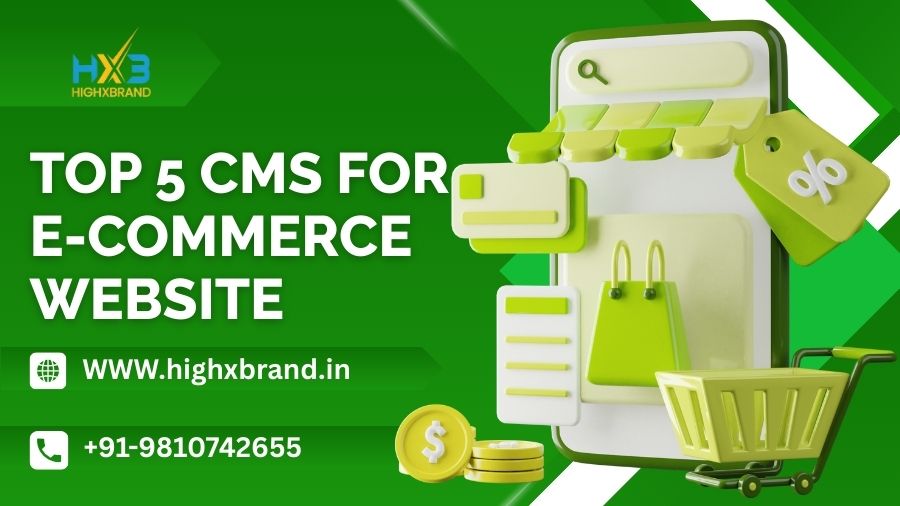In today’s fast-paced online environment, it is no longer optional to have an online store – it is vital. There is a difference between smaller businesses who want to expand beyond a local market, and larger companies with a goal of a worldwide customer base, however, your website is a significant part of the customer experience, and the sales process. A Content Management System (CMS) sits at the center of that online shop, also referred to as an e-commerce store.
With a good CMS, it’s easier to build, manage and grow your e-commerce store without extensive coding knowledge. The right CMS can help with product catalogs, orders, integrating payment gateways, marketing tools, whatever you need. The right CMS keeps your online store flowing as you would like while still allowing you to grow.
With so many different platforms to choose from, what is the best CMS for e-commerce? To help you decide, we have compiled the Top 5 CMS for E-commerce Websites with a list of their best features, flexibility, and scalability.
1. Shopify
What Makes Shopify Great
Shopify is one of the most popular CMS for e-commerce. It is a fully hosted platform which means it takes care of web hosting, security, and maintenance for you. Specifically designed for ease of use, any entrepreneur can open an e-commerce store, and with no coding experience, can still set it up in a short time.
Key Features
- Simple Installation: An easy-to-use and drag-and-drop store builder that comes with lots of different themes.
App Store: There are over 6,000 apps for marketing, payments, shipping, and even more.
- Payments: With Shopify Payments, you’re in a secure setup backed by Shopify, plus they allow you to integrate third-party payment processors like PayPal, Stripe, and Apple Pay.
- Mobile Ready: All of their themes are mobile-ready.
- Multi-channel: You can also sell on Facebook, Instagram, TikTok, Amazon, and more.
Pros
- Good for beginners who need a simple e-commerce solution.
- Shopify has friendly 24/7 support.
- Shopify allows your business to grow great, which is important for small to medium businesses.
Cons
- If you don’t use Shopify Payments, you’ll still pay transaction fees.
- Not as customizable as an open-source solution.
Best For
Business who is small or medium needing a good professional option that is easy to get started and get going, that is not complicated with technical issues.
2. WooCommerce (Plugin for WordPress website)
What makes WooCommerce Great
WooCommerce is a free plugin that is available to WordPress to create a full-function e-commerce store on your WordPress website. It is one of the most used e-commerce solutions globally it is so popular is because it is truly flexible and cost-effective. The fact that it is open-source gives you the flexibility and ability to customize and scale.
Key Features
- Customization: There are thousands of plugins and themes that can add additional functionality to WooCommerce.
- Search Engine Optimization: Since it is built off of WordPress it will have lots of search engine tools.
- Product Management: Using WooCommerce allows a business to easily manage their physical and digital products.
- Security and Payment: WooCommerce provides secure integration for payments through PayPal, Stripe, and local gateways.
- Community Assistance: There is a great community of developers.
Advantages
- Open source and free upon set up.
- It is very flexible and customizable.
- Good SEO functionality.
Disadvantages
- Requires hosting and domain.
- Requires technical ability for advanced customization.
- Plugins incur additional charges as you go along.
Best suited for
Business-minded individuals who want complete control over their store’s functionality and design, especially if they have already worked with WordPress.
3. Magento (Adobe Commerce)
What Makes Magento Unique
Magento is a powerful and very customizable CMS designed for large businesses and enterprises. It is highly known for its scalability, and great for businesses that are expecting to see high growth or large catalogs of products along with high volume traffic.
Key Features
- Scalability: Manage thousands of products with complex product categories.
- Customization: Create very highly and advanced flexibility to customize anything from storefront to checkout.
- B2B functionality: Bulk orders, custom pricing, corporate accounts.
- SEO: Built in tools to increase site performance.
- Integration: Easy integration of many ERPs, CRMs or marketing tools.
Advantages
- Very powerful and scalable.
- It is a great solution for e-commerce companies.
- Very flexible and customizable.
Disadvantages
- Steep learning curve for a beginner.
- Requires skilled developers for management.
- Expensive to develop and maintain.
Best suited for
Large organizations or companies intending to expand aggressively, that will require complicated product lines and complex features.
4. BigCommerce
Reasons to Consider BigCommerce
BigCommerce is a SaaS e-commerce solution that has a good balance between usability and built-in features. In comparison to Shopify, BigCommerce has more native features, meaning you will use less third-party apps.
Key Features
- Multi-Storefront Management: Manage multiple stores on one account.
- SEO: Advanced built-in SEO features to make your products easier to find by customers.
- No Transaction Fees: No additional transaction fees like in Shopify.
- B2B Features: Custom pricing, bulk pricing and quoting.
- Cross-Channel Selling: Intregation with Amazon, eBay and social channels.
Pros
- Feature-rich built-in tools.
- Less reliance on external 3rd party apps.
- Scalable for growing companies.
Cons
- Pricing is unbundled and scales with sales.
- Limited design flexiblity compared to Shopify.
Best For
Medium to large sized businesses who want advanced features and want to get the value without being dependent on a ton of apps.
5. Drupal Commerce
Reasons to Consider Drupal Commerce
Drupal commerce is an open source CMS that offers a custom e-commerce solution that you can easily build off of.
Key Features
- Highly customizable because you can create a shopping experience specific to your brand.
- Strong content management with built-in commerce features that helps you integrate commerce into any experience.
- Scalable — great for small stores and enterprise solutions.
- Good for multi-store businesses .because they support multiple languages.
- Community-driven, so they will have a reliable, strong open-source community.
Pros
- Endlessly customizable.
- Strong content- + commerce-driven specialization.
- Free, open-source.
Cons
- Requires experienced developers to help build and maintain.
- Has a smaller ecosystem than WordPress or Shopify.
- Uses a longer time to development.
Best For
Multilingual, complicated requirements or a deeply tailored e-commerce solution.
Conclusion
Choosing the best CMS for your e-commerce CMS for E-commerce Websitesdepends on your technical expertise, business size, and growth goals.
- If you want a simple. user-friendly platform. Shopify is your best bet.
- If you are on WordPress, and you want something with that level of customization. you can’t go wrong with WooCommerce.
- If you have the scope for a large-scale store and want content-driven complexity Magento. (Adobe Commerce) Is exceptionally powerful despite it being one of the priceier options.
- If you want to develop out-of-the-box features and don’t want to manage complexities through apps, look to BigCommerce.
- If your business requires customized, content-rich, commerce, look to Drupal Commerce.
No matter the CMS you chose, keep in mind your e-commerce should be able to grow with you, provide seamless experiences for customers with excellent, visual experiences.




